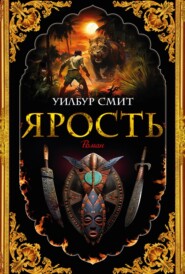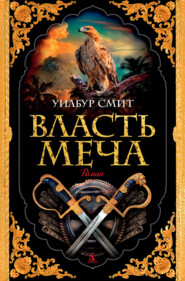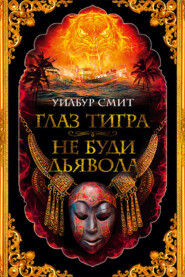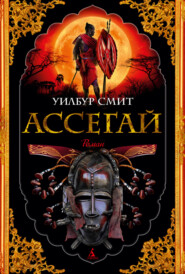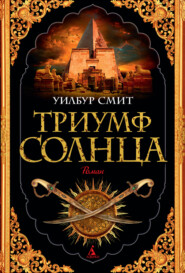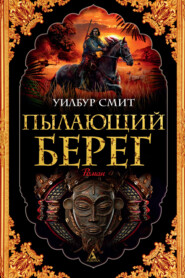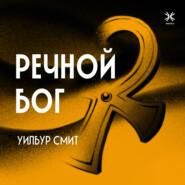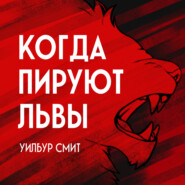По всем вопросам обращайтесь на: info@litportal.ru
(©) 2003-2025.
✖
Pharaoh
Автор
Год написания книги
2019
Настройки чтения
Размер шрифта
Высота строк
Поля
He smiled and said no more, but reached out with a hand that shook and fingers that trembled and took my own hand and held it to his chest until he fell asleep. The surgeons and his sons left his pavilion, and I swear I saw a faint smile cross Utteric’s lips as he sauntered out. I sat with Tamose until well after midnight, the same way I had sat with his mother at her parting, but finally the numbing fatigue of the day’s battle overwhelmed me. I freed my hand from his and, leaving him still smiling, I staggered to my own mattress and fell upon it in a death-like sleep.
My servants woke me before the first light had touched the dawn skies with gold. I dressed for battle with all haste and belted on my sword; then I hurried back to the royal pavilion. When I knelt once more at Pharaoh’s bedside he was smiling still, but his hands were cool to my touch and he was dead.
‘I will mourn for you later, my Mem,’ I promised him as I rose again to my feet, ‘but now I must go out and try once more to make good my oath to you and to our very Egypt.’
It is the curse of being a long liver: to survive all of those whom you love the best.
The remainder of our shattered legions were assembled in the neck of the pass before the golden city of Luxor where we had been holding the ravening hordes of the Hyksos at bay for the past thirty-five desperate days. In review I drove my war chariot along their decimated ranks and, as they recognized me, those who were still able to do so staggered to their feet. They stooped to drag their wounded comrades upright and to stand with them in their battle formations. Then all of them, men who were still hale and strong together with those who were more than halfway to their deaths, raised their weapons to the dawn sky and cheered me as I passed.
A rhythmic chant went up: ‘Taita! Taita! Taita!’
I choked back my tears to see these brave sons of Egypt in such desperate straits. I forced a smile to my lips and laughed and shouted encouragements back at them, calling to those stalwarts in the throng whom I knew so well, ‘Hey there, Osmen! I knew I would find you still in the front rank.’
‘Never more than a sword’s length behind you, my lord!’ he shouted back at me.
‘Lothan, you greedy old lion. Have you not already hacked down more than your fair share of the Hyksos dogs?’
‘Aye, but only half as many as you have, Lord Tata.’ Lothan was one of my especial favourites so I allowed him the use of my pet name. When I had passed the cheering dropped into a dreadful silence once more and they sank to their knees again and looked down the pass to where they knew the Hyksos legions were waiting only for the full light of dawn to renew their assault. The battleground around us was strewn thickly with the dead of the many long days of slaughter. The faint pre-dawn breeze bore the stench of death to where we waited. With each breath I drew it clung as thick as oil to my tongue and the back of my throat. I hawked and spat it over the side of my chariot, but with every subsequent breath it seemed to grow stronger and more repellent.
The carrion-eaters were already feasting on the piles of corpses that were scattered around us. The vultures and the crows hovered over the field on wide pinions and then dropped to the ground to compete with the jackals and hyenas in the shrieking and struggling mass, ripping at the rotting human flesh, tearing off lumps and tatters of it and swallowing them whole. I felt my own skin crawl with horror as I imagined the same end awaiting me when finally I succumbed to the Hyksos blades.
I shuddered and tried to put these thoughts aside as I shouted to my captains to send their archers forward to retrieve as many of the spent arrows from the corpses as they could find to refill their depleted quivers.
Then above the cacophony of squabbling birds and animals I heard the beat of a single drum echoing up the pass. My men heard it also. The sergeants bellowed orders and the archers hurried back from the field with the arrows they had salvaged. The men in the waiting ranks came to their feet and formed up shoulder to shoulder with their shields overlapping. The blades of their swords and the heads of their spears were chipped and blunted with hard use, but still they presented them towards the enemy. The limbs of their bows had been bound up with twine where the wood had cracked and many of the arrows they had retrieved from the battlefield were missing their fletchings, but they would still fly true enough to do the business at point-blank range. My men were veterans and they knew all the tricks for getting the very best out of damaged weapons and equipment.
In the distant mouth of the pass the enemy masses began to appear out of the pre-dawn gloom. At first their formations seemed shrunken and diminished by distance and the early light, but they swelled rapidly in size as they marched forward to engage us. The vultures shrieked and squawked and then rose into the air; the jackals and other scavengers scurried away before the advance of the enemy. The floor of the pass was filled from side to side by the Hyksos multitudes, and not for the first time I felt my spirits quail. It seemed that we were outnumbered by at least three or even four to our one.
However, as they drew closer I saw that we had mauled them as savagely in return for how they had treated us. Most of them had been wounded, and their injuries were bound up with bloodstained rags, as were ours. Some of them limped along on crutches, and others lurched and staggered as they were harried along by their sergeants, most of whom were wielding rawhide whips. I exulted to see them obliged to use such extreme measures to induce their men to hold their formations. I drove my chariot along the front rank of my own men shouting encouragement to them and pointing out the Hyksos captains’ use of their whips.
‘Men like you never need the whip to convince you of your duty.’ My voice carried clearly to them above the beat of the Hyksos drums and the tramp of their armoured feet. My men cheered me and shouted insults and derision at the approaching enemy ranks. All the time I was judging the dwindling distance that separated the leading ranks of our opposing armies. I had only 52 chariots remaining out of the 320 with which I had begun this campaign. The attrition of our horses had been bitterly hard to bear. But our only advantage was that we were in a strong position here at the head of the steep and rugged pass. I had chosen it with all the care and cunning learned in countless battles over my long lifetime.
The Hyksos relied heavily on their chariots to bring their archers within easy range of our ranks. Despite our example they had never developed the recurved bow, but had clung stubbornly to the straight-limbed bow which was incapable of loosing an arrow as fast and therefore as far as our superior weapons. By forcing them to abandon their chariots at the bottom of the rocky pass I had denied them the opportunity of getting their archers swiftly to within easy range of our infantry.
Now the critical moment arrived when I must deploy my remaining chariots. I led this squadron in person as we raced out in line ahead and swept down the front of the Hyksos advance. Loosing our arrows into their massed ranks from a range of sixty or seventy paces we were able to kill or maim almost thirty of the enemy before they were able to come at us.
When this happened I leaped down from the platform of my vehicle and while my driver whisked it away I squeezed myself into the centre of the front rank and locked my shield in between two of my companions and presented it towards the enemy.
Almost immediately followed the tumultuous moment when the battle was joined in earnest. The enemy phalanx crashed into our front with a mighty clangour of bronze on bronze. With shields interlocked the opposing armies shoved and heaved against each other, straining to force a breakthrough of the opposing line. It was a gargantuan struggle which wrapped us all in a state of intimacy more obscene than any sexually perverse act. Belly to belly and face to face we struggled so that when we grunted and screamed like animals in rut the spittle flew from our twisted mouths into the faces of the enemy that confronted us from merely inches away.
We were packed too closely to be able to use our long weapons. We were crushed between banks of bronze shields. To lose one’s footing was to go down and be grievously trampled if not killed by the bronze sandals of allies as well as those of our enemies.
I have fought so often in the shield wall as to have designed a particular weapon especially for the purpose. The long blade of the cavalry sword must stay firmly in its sheath, and be replaced by a thin dagger with a blade no longer than a hand’s span. When both your arms are trapped in the press of armoured bodies and the face of your enemy is only inches from your own, then you will still be able to make use of this tiny weapon and place the point of the blade in a chink in your enemy’s frontal armour and thrust home.
This day before the gates of Luxor I killed at least ten of the swarthy bearded Hyksos brutes on the same spot, and without moving my right hand more than a few inches. It gave me an inordinate sense of satisfaction to look into the eyes of my enemy, to watch his features contort in agony as he felt my blade pierce his vitals and finally to feel his last breath blow hot into my face as he expelled it from his lungs before he collapsed. I am not by nature a cruel or vindictive person, but the good god Horus knows that my people and I have suffered enough at the hands of this barbarous tribe to revel in whatever retaliation becomes available to us.
I do not know just how long we were locked in the shield wall. It seemed to me at the time to be many hours of brutal struggle, but I knew by the changing angle of the pitiless sun above us that it was less than an hour before the Hyksos hordes disengaged from our ranks and fell back a short distance. Both sides were exhausted by the ferocity of the struggle. We confronted each other across the narrow strip of ground, panting like wild animals, sodden with our own blood and sweat and reeling on our feet. However, I knew from hard experience that this respite would be short-lived, and then we would fly at each other again like rabid dogs. I also knew that this was our last battle. I looked at the men around me and saw that they were close to the end. They numbered no more than twelve hundred. Perhaps they could survive another hour in the shield wall, but little more than that. Then it would be over. My despair came close to overwhelming me.
Then suddenly there was somebody behind me, tugging at my arm and shouting words at me that at first made little sense. ‘My Lord Taita, there is another large detachment of the enemy coming up in our rear. They have us completely surrounded. Unless you can think of a way to save the day then we are done for.’
I spun around to confront the bearer of such terrible tidings. If this were true then we were damned and double damned. And yet the man who stood before me was someone that I knew I could trust. He was one of the most promising young officers in the army of Pharaoh. He commanded the 101st Squadron of heavy chariots. ‘Take me and show me, Merab!’ I ordered him.
‘This way, my lord! I have a fresh horse for you.’ He must have seen how near I was to complete exhaustion for he seized my arm and helped me back over the piles of dead and dying men and abandoned weapons and other warlike accoutrements that littered the field. We reached the small detachment of our own legionaries in the rear who held a pair of fresh horses for us. By then I had recovered sufficiently to shake off Merab’s helping hand. I hate to show even the slightest sign of weakness before my men.
I mounted one of the horses and led this small group back at a gallop over the ridge of high ground that lay between us and the lower reaches of the River Nile. On the crest I reined in my steed so abruptly that it arched its neck and pranced around in a tight circle. I found myself at a loss to express my despair.
From what Merab had told me earlier I expected to find perhaps three or four hundred fresh Hyksos troops marching up behind us to engage us. That would have been sufficient numbers to seal our fate. Instead I was confronted by a mighty army of literally thousands of infantry and at least five hundred chariots and as many again of mounted cavalry, which thronged the nearest bank of the Nile. They were in the process of disembarking from a flotilla of foreign warships that was now moored along the bank of the river below our golden city of Luxor.
The leading formation of enemy cavalry had already disembarked, and as soon as they spotted our pathetic little troop of a dozen or so men they came galloping up the slope to engage us. I found myself caught up in a hopeless quandary. Our horses were all but used up. If we turned tail and tried to out-run those magnificent and obviously fresh animals they would catch us before we had covered a hundred paces. If we stood at bay and tried to make a fight of it, they would cut us down without working up a sweat.
Then I forced back my despair and looked again at these strangers with fresh vision. I felt a faint tugging of relief, enough to bolster my spirits. Those were not Hyksos war helmets that they were wearing. Those were not typically Hyksos galleys from which they were disembarking
‘Hold your ground, Captain Merab!’ I snapped at him. ‘I am going forward to parley with these newcomers.’ Before he had a chance to argue with me I had unhooked my sword sheath from my belt and, without drawing the naked blade, I reversed it and held it aloft in the universal sign of peace. Then I trotted slowly down the slope to meet this troop of foreign horsemen.
I vividly recall the sense of doom that overshadowed me as we closed. I knew that this time I had pushed Tyche, the goddess of Providence, too far. Then to my astonishment the leader of the band of horsemen barked an order and his men obediently sheathed their swords in a sign of truce and halted in a tight formation behind him.
I followed their example and reined my own steed down to a halt, facing them but with a few dozen strides separating myself and the leader of the group. We studied each other in silence for the time it takes to draw a deep breath, and then I lifted the visor of my battered helmet to show my face.
The leader of this foreign band of horsemen laughed. It was a most unexpected sound in these fraught circumstances, but at the same time it was hauntingly familiar. I knew that laugh. However, I stared at him for fully half a minute before I recognized him. He was a greybeard now, but big and muscled and sure of himself. He was no longer the young buck with the fresh and eager face searching to find his place in this hard, unforgiving world. Clearly he had found that place. Now he had the air of high command about his person and a mighty army at his back.
‘Zaras?’ I said his name dubiously. ‘It cannot possibly be you, can it?’
‘Only the name is somewhat different but everything else about me is the same, Taita. Except possibly I am a trifle older and I trust a little wiser.’
‘You remember me still, after all these years. How long has it been?’ I demanded of him wonderingly.
‘It has been a mere thirty years, and yes, I remember you still. I will never forget you; not if I live for ten times longer than I have already.’
Now it was my turn to laugh. ‘You say your name is changed. What name are you known by now, good Zaras?’
‘I have taken the name Hurotas. My former name had certain unfortunate connotations to it,’ he replied. I smiled at this blatant understatement.
‘So now you have the same name as the King of Lacedaemon?’ I asked. I had heard that name before, and it was always uttered with the deepest awe and respect.
‘The exact same,’ he agreed, ‘for the young Zaras you once knew has become that king of whom you now speak.’
‘Surely you jest?’ I exclaimed in astonishment, for it seemed that my old subordinate of yesteryear had risen high in the world – in fact to the very pinnacle. ‘But if you speak the truth tell me what has happened to the sister of Pharaoh Tamose, the royal Princess Tehuti, whom you abducted out of my charge and care.’
‘The word you are groping for is wooed and not abducted. And she is no longer a princess.’ He shook his head firmly. ‘She is now a queen, because she showed the good sense to marry me.’
‘Is she still the most beautiful woman in the world?’ I asked more than a trifle wistfully.
‘In the vernacular of my kingdom, Sparta means “the loveliest one”. I named the city in her honour. So now the Princess Tehuti has become Queen Sparta of Lacedaemon.’
‘And what of the others who are also dear to my heart and memory that you took north with you, all those years ago—?’
‘Of course, you are speaking of Princess Bekatha and Hui.’ King Hurotas cut my questions short. ‘They are also now husband and wife. However, Hui is no longer a lowly captain. He is the Lord High Admiral and the commander of the Lacedaemon fleet; the same fleet that you see down there on the river.’ He pointed behind him at the tremendous array of shipping anchored against the bank of the Nile. ‘Right now he is supervising the landing of the remainder of my expeditionary force.’
‘And so, King Hurotas, why have you returned to Egypt now after all these years?’ I demanded.






